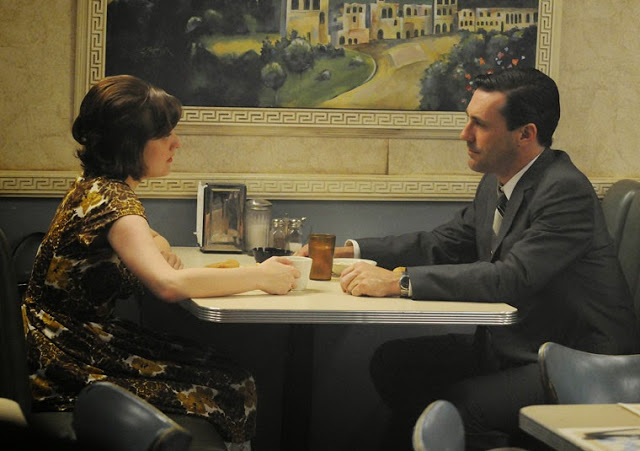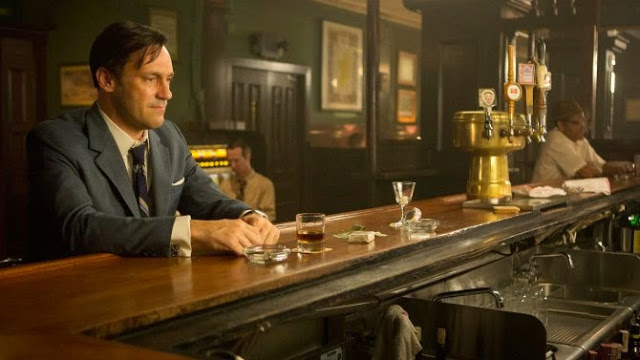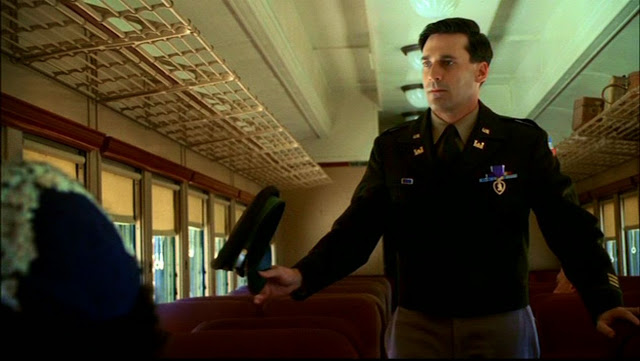The overarching theme of Mad Men has been that people don’t change.
Characters, and most notably Don, make the same mistakes over and over again.
Don is locked in a cycle of imploding marriages, drinking himself to near-death and alienating his friends and family. In the finale Matthew Weiner appears to hold true to this belief about human nature, where Don hits rock bottom yet again, and once again goes back to advertising.
But Weiner is trying to have his cake and eat it too.
In the final shot of Don appears to be at peace. The implication is that the idea for the Coca-Cola ad is so brilliant that it some how acts as a catharsis.
Or, that the self-realization he had from the group therapy session solved his crisis, allowing him to once again think up great ideas.
Here’s the problem: Don will be miserable as long as he’s in advertising. Any connection between the Coca-Cola ad bringing him happiness rings hollow for what the show has always been about.
Don’s upward trajectory in the advertising world has always been correlated with his personal life unraveling. Succeeding at the pitch is a thrill for him, but it doesn’t make him happy. If it did, he’d be the happiest, most fulfilled person ever. But it’s a job that has little meaning beyond making money.
And Don knows this.
A few episodes ago he asks Peggy what her dream is; she says to be a creative director, like Don. He rebukes her, telling her that there is more to life. And back in the first season he tells Roger that if he were to leave Sterling Cooper it will be to do something completely different.
Don simply cannot find happiness through advertising. The work is a cancer on his life.
As I see it, the episodes could have played out exactly as it did, but at that final scene, instead of it being Don meditating by the sea with a smile on his face, he’s at a bar looking like a complete wreck. As long as he’s in advertising he’s not going to overcome his alcoholism.
All of this being said, my reading of the ending differs slightly from the majority, though my underling criticism still remains the same: Don didn’t have any kind of self-realization in the group therapy session. Instead, the story he hears is what gives him the idea for the Coke commercial right at that moment, and his emotional outburst is relief that he can now go home.
In the proceeding scene Peggy tells Don that he can come home to McCann, that he can work on Coke. Don replies that he cannot return because he’s messed everything up. Then during the group therapy session, the story he hears involves a dream where the storyteller is a product in the refrigerator that nobody is picking. In the commercial the Coke bottle each person is holding acts as an extension of themselves — they are the coke bottles.
To further bolster this theory, it’s classic Don to hear someone bare their soul, tell a story that is similar to his life story, and his only takeaway from it is an ad campaign. He misses out on the true emotional importance of the story and settles for what makes someone temporarily happy.
Had Don actually had an epiphany from the story he wouldn’t have gone back to advertising — he would have gotten the hell out of the business. But even with this reading — which I of course think is correct — there’s still the incongruity of Don being at peace. He’d be relieved that he gets to go back home and be a drunk rather than live as poor Okie in California again.
Final note: If there is anything about the finale that leaves me unsatisfied, it’s that the Dick Whitman storyline was never seen through completion.
If there is one thing that has actually changed about Don over the course of the show it’s that each season he has revealed more and more about his past to his family and friends. He’s gone from having panic attacks when people learn the truth to joking about his upbringing.
And in the final episodes he seemed ready to come out to the world as Dick. Each of the recent episodes ended with him shedding a part of the Don Draper persona: his wife, his business, his apartment, his job, and his belongings. But then in this final episode nothing more was said about him being Dick.
Like the Sharron Tate allusions it ended up being a red herring.














































































































